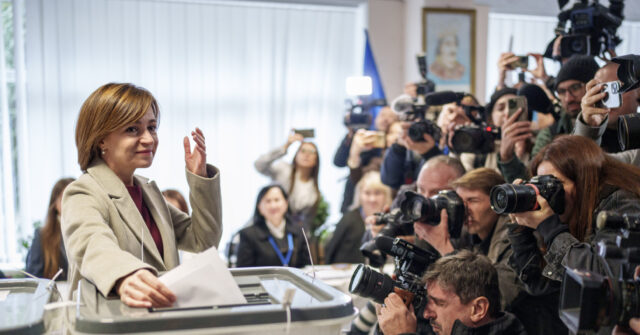Moldova recently held a contentious referendum on its path toward European Union membership, resulting in a narrow victory for the pro-EU camp. The electoral data, with 99.41% of approximately 1.4 million votes counted, indicated a “Yes” vote of 50.39% compared to 49.61% for “No.” This referendum represented a significant national moment, as an unfavorable outcome would have dealt a heavy blow to the pro-Western government led by President Maia Sandu. Ultimately, the result was seen as a fierce endorsement for EU integration, countering the alleged disruptions posed by Russian interference, which Sandu claimed were attempts to undermine the sovereignty of Moldova.
President Sandu highlighted the looming issues of voter fraud and foreign meddling following the referendum. Describing the events as a “vile attack” on Moldova’s democratic processes, she emphasized the necessity for reform within the justice system to tackle corruption more effectively. In her statements, she underscored the importance of ensuring the integrity of electoral processes and addressing the deficiencies that had allowed for such purported malfeasance. This situation reveals deep-seated concerns within the country regarding its democratic institutions and the challenges posed by external actors opposing Moldova’s Western alignment.
The notion of Russian interference prominently features in the political discourse surrounding the referendum. Moldovan authorities accused Moscow of engaging in a “hybrid war,” aiming to destabilize the country’s political landscape and thwart its EU aspirations. Allegations included not only funding for pro-Moscow opposition groups and spreading disinformation, but also direct participation in vote-buying schemes. The European Commission corroborated these claims, noting an unprecedented level of interference aimed specifically at undermining the democratic processes in Moldova as it sought to orient itself more closely with the EU.
While the referendum itself yielded a favorable outcome, the opinion among local analysts reflects skepticism about the pro-EU sentiment among the general populace. Cristian Cantir, an associate professor of international relations, articulated concerns that early polling results may have miscalculated the extent of pro-EU support, emphasizing that without significant votes from the diaspora, the referendum would likely have failed. Such dynamics not only complicate the legitimacy of the referendum results but also risk reinforcing narratives leveraged by Kremlin-backed forces aiming to maintain influence in the region.
The intricacies of the referendum are further compounded by ongoing geopolitical tensions. The U.S. has echoed concerns regarding Russian efforts to undermine Moldova’s electoral integrity and European integration, further highlighting the regional instability that has grown since Russia invaded Ukraine. The U.S. national security spokesman John Kirby’s comments reflect a broader international anxiety about Russian interference in the democratic processes of its neighboring states, reinforcing the need for vigilance against such subversive tactics.
In addition to the referendum, Moldova has been navigating an array of challenges, including the threat from Ilan Shor, an exiled pro-Russian oligarch accused of extensive vote-buying schemes aimed at derailing the pro-EU government. Shor’s party has been banned, following his conviction of financial crimes, underscoring the persistent corruption that beleaguers Moldovan politics. Furthermore, reports of training young Moldovans in Moscow for potential civil unrest illustrate the depth of the ongoing political struggle in Moldova, challenging the pro-Western government’s stability as its path toward EU membership continues. As the nation heads toward a parliamentary election next year, the stakes for Moldovan democracy and its European aspirations remain alarmingly high.

